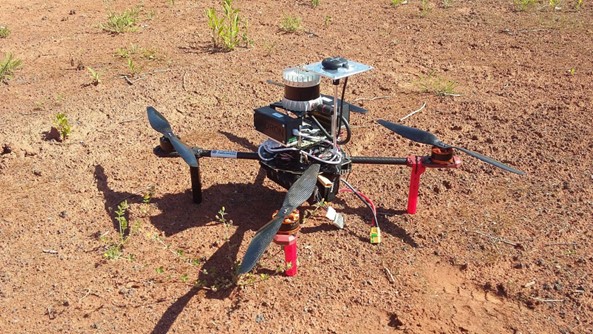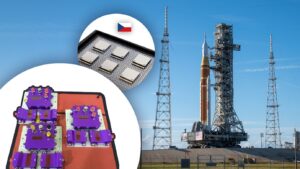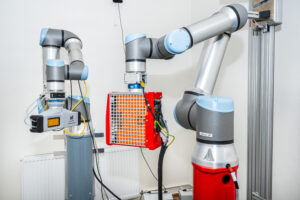A week of frenetic search for a radioactive needle in a haystack. At the end of January media reported about an enormous effort of emergency departments in Western Australia. A tiny capsule of radioactive Cesium-137 was lost there – somewhere along a stretch of desert roughly the length of California’s coastline. Now some scientists from the Czech Republic are convinced, that such a situation could be solved much easier thanks to their innovative technology called RaDron.
The RaDron project (video↗) combines cutting edge single particle detectors manufactured by ADVACAM company and autonomous drones from the Czech Technical University in Prague. Core of the technology, a TimePix3 chip, was originally developed by the European Organization for Nuclear Research (CERN).
Over the last three years the scientific team has experimentally proved a technology concept for localization of sources of ionizing radiation. One of their goals was to significantly shorten the time needed to find any commonly used radioactive source.
Localization within 1-2 minutes
The researchers have tested several strategies for autonomous localization of the static and moving source of radiation. According to the experiments performed, a much weaker Cesium-137 source can be localized within 1-2 minutes in the area of 1000 m2.
“In contrast to existing technology, our compact sensors can give direction towards the source of radiation, not only detecting its presence. That is what makes the searching process much faster – the order of magnitude at least. People in Australia were lucky, because it was found only six feets away from the side of the road. We would be able to discover it even if it would be many meters away,” explains Jan Jakůbek, CTO at Advacam.
Autonomous searching
The TimePix3 chip provides complete information about each detected radiation particle – the position, energy and time of interaction. It is a very powerful tool for advanced dosimetry and characterization of the radiation field. It can be also operated in a mode of Compton camera, providing the direction of the incoming photons based on the Compton effect in the sensor.
“Our detectors working in Compton camera mode provide the direction where the radiation comes from. That means there is no need to slowly systematically map the area, ” describes Daniela Doubravová, RaDron project leader, ADVACAM.
“In addition, we have demonstrated that the possibility of deploying a team of cooperating drones allows to accurately locate even a moving source of radiation, which is very difficult with the current technology,” presents Martin Saska, head of Multi-robot Systems Group at the Faculty of Electrical Engineering, CTU in Prague.
Looking for partners
The non-commercial scientific project funded by the Technology Agency of the Czech Republic was successfully finished last year. The concept was proved and a set of prototypes was constructed.
“However, we still need a commercial partner, who would actually bring this combination of our detectors with the drones to the market,” says Jan Jakůbek.
Use cases
- accident of a car carrying radioactive material
- fire in the radiological department of a hospital
- nuclear accidents
- searching for a stolen or lost radiation source
In practice, we expect a cooperation of ground and aerial vehicles and a complex approach combining several detection methods that cover:
- systematic scanning of the area of interest and measurement of the radiation map
- determination of the area affected by the radiation
- identification of radiation source type
- localization of separated sources or hotspots using Compton camera
- monitoring of changes of the radiological situation in time
About ADVACAM
ADVACAM is an innovative company from the Czech Republic. Its unique single particle detectors operate at the International Space Station (ISS) and will take part in radiation monitoring of the NASA Artemis Programme as well.
Feel free to use the attached press release. Our experts are ready to answer any further question.
You also can download a PresKit including some video statements.
Martin Tyburec
PR manager ADVACAM
martin.tyburec@advacam.cz
+420 732 670 960


